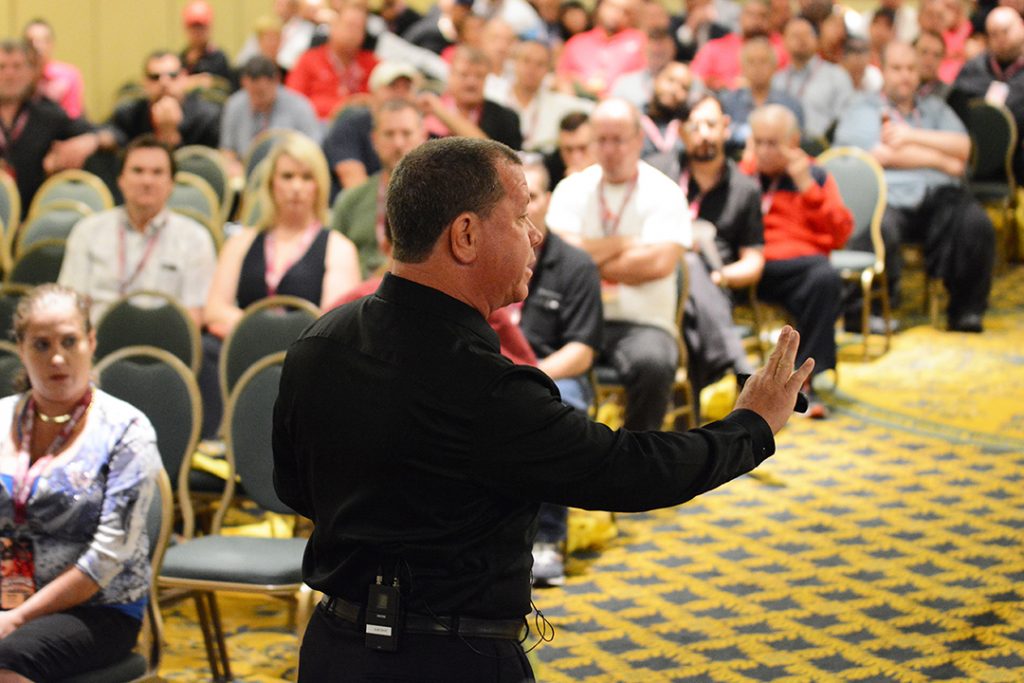At EXPO 2019, Nightclub Security Consultants is presenting a very specific training certification seminar on Proper Use of Force where the training can result in fewer lawsuits, fewer police calls and lower insurance premiums.

As a 31-year-old rookie police officer in San Diego, Robert Smith didn’t understand why other, younger, rookie officers didn’t talk their way out of using force. And when he had to use force as a police offer and detective, he never had a complaint against him for excessive force or even perceived force — because he made it a point to learn and understand the Law Enforcement Force Continuum. “Using the Law Enforcement Force Continuum as a model, I have molded it to suit the hospitality industry and this was very crucial for what I wanted to teach my clients,” says Smith. “The teaching of proper use of force has been critical in gaining popularity among national insurance carriers and brokers who mandate our training as a condition of insurance for the club or bar.”
ED Magazine spoke with Smith about the practical skills attendees will learn at the seminar and the cost-benefit analysis proper certification can yield for club owners and operators.
ED: This isn’t just a standard EXPO seminar; your training certification seminar is offering very specific advice on a very specific subject. What practical skills will attendees of your training seminar walk away with?
 SMITH: Fear of the unknown is one of the causes of increase premise liability. This session will clear the fear away. Attendees will understand and learn the legal limits to using any sort of force. This explanation will fit any employee in any club in any state. This topic is actually very simple but the words used by the legal system make the topic fearful and questionable. I promise to take the fear away.
SMITH: Fear of the unknown is one of the causes of increase premise liability. This session will clear the fear away. Attendees will understand and learn the legal limits to using any sort of force. This explanation will fit any employee in any club in any state. This topic is actually very simple but the words used by the legal system make the topic fearful and questionable. I promise to take the fear away.
ED: What’s the biggest misconception about proper use of force you hope to clear up with this seminar?
SMITH: When I train across the country, I hear so many urban legends and wives’ tales about when force can be used and how much can be used. However, over the past five years, there have been some major changes in who is committing violent acts in clubs — women are becoming more violent. Currently, the most common misconception I hear is that a male security guard cannot grab and wrap up a female who is violent and that using force on a female can be considered sexual harassment or sexual assault.
ED: Why is it crucial for staff to attend, as opposed to just club owners acting as delegates?
SMITH: I was interviewed in 2001 by a news agency and said “employee use of force claims are the most preventable losses the hospitality industry faces”. To me, this was true then and still true now. If attendees (security, managers, owners) can truly understand what is legal, they can automatically lower their liability. It’s so very simple.
“Fear of the unknown is one of the causes of increase premise liability. This session will clear the fear away. Attendees will understand and learn the legal limits to using any sort of force.”
— Robert Smith
ED: Talk about the cost benefits of proper training in the early stages for potential litigation down the road?
SMITH: As someone who does not own or operate a club, an “outsider” if you will, I see two methods that the clubs make money. The first is direct revenue from clients as they pay cover, purchase drinks or VIP services. The second is from what I call “back of house” money. This is money made from savings on other proactive actions or products by the club owner or manager. If (a club’s staff has proper security training) savings will absolutely be seen from fewer violent incidents, fewer police visits, fewer guest complaints, fewer civil liability suits and finally, lower insurance premiums. These “back of house” savings from all the listed benefits can lead to hundreds of thousands of dollars annually. That’s pretty good!
To register for EXPO 2019, call ED Publications at (727) 726-3592, or register online at www.theEDexpo.com. Bring your key staff members for this incredible opportunity for them to receive Certificates of Completion in four important areas of club operations.






























